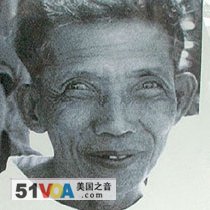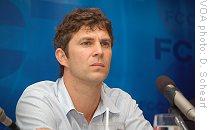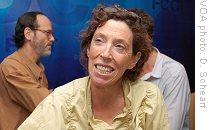Bangkok
16 February 2009
A war crimes tribunal in Cambodia is about to take up the first prosecution of a Khmer Rouge official accused in connection with 1.7 million deaths during the regime's reign of terror.
But there are questions whether the court can be politically independent or help reconcile the country.
 |
| Kaing Guek Eav, also known as, Duch |
Kaing Guek Eav, known as Duch, faces charges of war crimes, crimes against humanity, torture and murder for his role as head of the S-21 detention center.
More than 12,000 Cambodians accused of disloyalty to the Khmer Rouge were jailed, tortured and executed at the Phnom Penh center.
William Smith, a deputy co-prosecutor for the case, spoke on a panel to journalists in Bangkok last week. He said the hearing Tuesday would decide on procedural matters and hear legal arguments against the case.
 |
| William Smith, Deputy Co-Prosecutor, Bangkok, 11 Feb. 09 |
Duch was found and interviewed by journalist Nic Dunlop in 1999 along the Thai-Cambodia border.
Shortly after, he was taken into custody and held for eight years before being turned over to the war crimes tribunal.
 |
| Richard Rogers, Defense Support, Bangkok, 11 Feb. 09 |
"As a court dispensing justice that is not just about punishment or retribution, but is also about reconciliation and closure, what is the appropriate sentence, if any, for a man such as Duch - a man who has confessed to his crimes, who has assisted the investigation, and who has shown remorse and asked for forgiveness?" Rogers asked.
There are four higher ranking former Khmer Rouge leaders now in custody who are set to face trial next year.
A foreign co-prosecutor at the tribunal recommended six additional former Khmer Rouge leaders be brought to trial but his Cambodian counterpart objected. The objection raised concerns the Cambodian government was pressuring the court to limit prosecutions.
The Cambodian government has many former Khmer Rouge cadres, including Prime Minister Hun Sen. He has indicated he wants the trials limited to the five prosecutions.
Heather Ryan spoke on the panel for the Open Society Justice Initiative, an organization monitoring the tribunal's fairness.
 |
| Heather Ryan, Open Society Justice Initiative, Bangkok, 11 Feb. 09 |
Ryan says another problem is raising awareness among Cambodians. More than half of Cambodia's current population was born after the Khmer Rouge period and she says many young people question the extent of recorded atrocities.
"This court will not be a success, no matter how good the trials are, if the people of Cambodia don't know and understand what's going on," Ryan said.
The communist Khmer Rouge controlled Cambodia for only a few years, but their reign of terror resulted in the deaths of an estimated one point seven million Cambodians.
Under their fanatical leader, Pol Pot, the Khmer Rouge attempted to create a communist utopia.
City dwellers were forced into the countryside and anyone who looked educated or was accused of disloyalty was tortured and often executed.
The Khmer Rouge was ousted when Vietnam, fed up with Pol Pot's excesses, invaded in 1979.
The Khmer Rouge was driven to the Thai border, where they fought a guerrilla-style civil war for more than a decade before their members were slowly captured or surrendered. Pol Pot died before he could face trial.